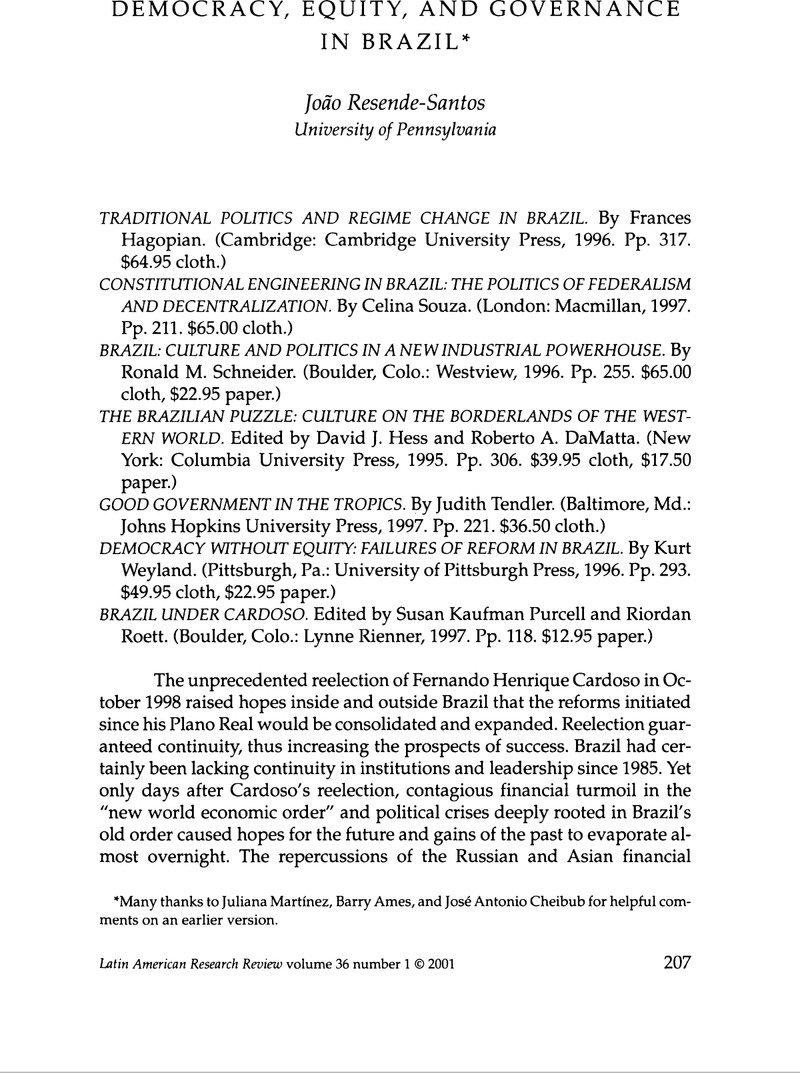Article contents
Democracy, Equity, and Governance in Brazil
Review products
Published online by Cambridge University Press: 05 October 2022
Abstract

- Type
- Review Essays
- Information
- Copyright
- Copyright © 2001 by the University of Texas Press
Footnotes
Many thanks to Juliana Martínez, Barry Ames, and José Antonio Cheibub for helpful comments on an earlier version.
References
1. See for example Leôncio Martins Rodrigues, “Eleições, fragmentação partidária e governabilidade,” Novos Estudos, no. 41 (Mar. 1995):78–93; Fernando Limongi and Argelina Cheibub Figueiredo, “Mudança constitucional, desempenho do legislativo e consolidação institucional,” Revista Brasileira de Ciências Sociais 29 (1995):24–37; and Limongi and Figueiredo, “Partidos políticos na Câmara dos Deputados, 1989–1994,” Dados 38, no. 3 (1995):497–525.
2. Kurt Weyland, “Neopopulism and Neoliberalism in Latin America,” Studies in Comparative International Development 31, no. 3 (Fall 1996):3–31.
3. Edward N. Muller, “Democracy, Economic Development, and Income Inequality,” American Sociological Review 53 (Feb. 1988):50–68.
4. In just five years (1986–1991), the number of cabinet ministries was reduced from a high of twenty-seven under Sarney to thirteen under Collor.
5. Barry Ames, Political Survival: Politicians and Public Policy in Latin America (Berkeley and Los Angeles: University of California Press, 1987).
6. Since the constitutional amendments in 1993 to create the Fundo da Emergência Social, which were passed as part of Cardoso's Plano Real, the federal government continues to alter transfer mandates in its favor. A centerpiece of Cardoso's reform agenda, the Fundo de Estabilização Fiscal (FEF), is a constitutional revision to allow the federal government to withhold up to 40 percent of revenues. Another piece of legislation, the Lei da Responsabilidade Fiscal, imposes fiscal discipline on subnational governments, subjecting those who engage in deficit spending to prosecution.
7. See Karen L. Remmer, Military Rule in Latin America (Boston, Mass.: Unwin Hyman, 1989).
8. Frances Hagopian, “Democracy by Undemocratic Means? Elites, Political Pacts, and Regime Transition in Brazil,” Comparative Political Studies 23 (July 1990):147–70; and “After Regime Change: Authoritarian Legacies, Political Representation, and the Democratic Future of South America,” World Politics 45, no. 3 (Apr. 1993):464–501.
9. Bolivar Lamounier, “Authoritarian Brazil Revisited: The Impact of Elections on the Abertura,” in Democratizing Brazil: Prospects of Transition and Consolidation, edited by Alfred Stepan (New York: Oxford, 1989), 43–79.
10. The decision to rely on traditional politicians rather than colonize the state government and apparatus with military personnel is an interesting issue, but one not addressed in Hagopian. The decision likely reflects both the political divisions within the military and the hesitation of most officers to politicize the military through long-term rule or to blur the distinction between the military as the government and the military as an institution.
11. Wendy Hunter, Politicians against Soldiers: Eroding Military Influence in Brazil (Chapel Hill: University of North Carolina Press, 1997).
12. Karen Remmer, “Democracy and Economic Crisis: The Latin American Experience,” World Politics 42, no. 2 (Apr. 1990):315–35.
13. The irony is that for almost a decade, Latin America was being told to “be like East Asia,” despite mounting evidence that the donor community's model of East Asia was based on fiction, and also despite the fact that both public sectors were equally interventionist and (as it turns out) public management in East Asia was no less corrupt or inefficient.
14. The seat count is an estimate of members of declared pro-government coalition parties: the Partido da Social Democracia Brasileira (PSDB), the Partido da Frente Liberal (PFL), the Partido do Movimiento Democrático Brasileiro (PMDB), and the Partido Progressivo Brasileiro (PPB), as well as the “parliamentary alliance” of the PSDB with the Partido Trabalhista Brasileiro (PTB). Constitutional amendments require a three-fifths majority in two rounds of voting, although current legislation is under way to revise these requirements. Although Cardoso's electoral and legislative alliances have remained relatively stable and delivered major congressional victories on key government projects, they have also been stormy and internally competitive.
- 3
- Cited by




